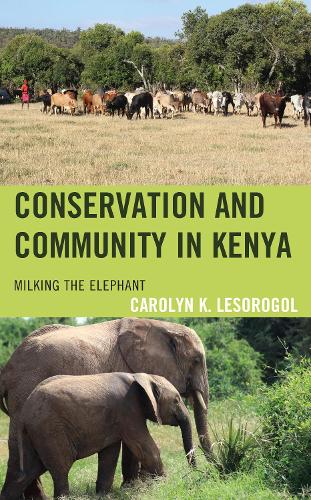
Conservation and Community in Kenya: Milking the Elephant
(Hardback)
Publishing Details
Conservation and Community in Kenya: Milking the Elephant
By (Author) Carolyn K. Lesorogol
Bloomsbury Publishing PLC
Lexington Books
21st June 2022
United States
Classifications
Professional and Scholarly
Non Fiction
Conservation of the environment
305.896762757
Physical Properties
Hardback
238
Width 160mm, Height 226mm, Spine 24mm
531g
Description
Community-based wildlife conservation is promoted as a win-win solution for wildlife and people that will protect biodiversity while improving the economic status of communities living among wildlife. This book, based on mixed-method anthropological research conducted in Samburu County, Kenya, demonstrates that, counter to simple narratives promising benefits, community-based wildlife conservancies (CBCs) are complex social institutions layered on pre-existing land use practices with differential impacts for members. Using ethnographic and mixed methods, the Carolyn K. Lesorogol explains how diverse social actors understand and operate CBCs, how benefits and costs are distributed, the gendered nature of CBCs, and how they impact cooperation and conflict in communities. Lesorogrols analysis shows that economic benefits to members are generally very limited, and while some perceive improvements in security emanating from CBCs, there is also evidence that they heighten tensions over land use as well as human-wildlife conflict. This book offers critical insights into the implications of the CBC model for local pastoralist livelihoods, conservation, and social relations.
Reviews
Conservation and Community in Kenya: Milking the Elephant is an important work in the context of community-based conservation, which is becoming a progressively relevant land use option in East Africa.
Carolyn K. Lesorogol convincingly argues that the hope of successful community-based conservation lies not just in encouraging greater disbursement of funding but also the nurturing of the value of wildlife protection and pride in a conservation enterprise that is felt as 'owned' by the communities. Her work reflects two elements of scholarship: a systematic study using explicit methods, and an ethnographic study resting on her own background knowledge and her ear-to-the-ground exploration of what is actually happening below the surface. The result is a rich and valuable contribution to the literature on an important and globally significant experiment in trying to reconcile environmental protection and community livelihoods through the creation of community-based wildlife conservancies.
In this detailed and readable ethnography, Lesorogol, an anthropologist specializing in social change, examines and evaluates the interaction of community-based wildlife conservancies (CBCs) with traditional and contemporary institutions governing land management in three communities in the pastoral Samburu region of northern Kenya. Lesorogol proposes a more general application of "institutional layering" as a viable framework for acknowledging the needs of multiple social structures within pastoral cultures engaged with land management and promoting effective planning among them for wildlife resources. A useful addition to the literatures of economic anthropology, the anthropology of development, and the evolving issues associated with the implementation of community-based wildlife conservation projects in Africa. Recommended. Advanced undergraduates through faculty.
Author Bio
Carolyn K. Lesorogol is professor at the Brown School at Washington University in St. Louis.
